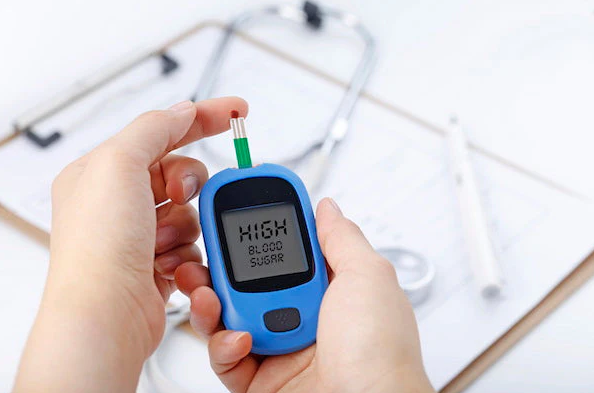Monitoring blood sugar levels isn’t just for those diagnosed with diabetes—it’s essential for everyone. Imbalanced blood sugar can cause a range of health issues, and some of the symptoms can be present without you realizing it. High blood sugar, also known as hyperglycemia, is a common issue that can lead to more severe complications if left untreated. This article will uncover 12 signs that indicate your blood sugar may be too high, discuss the potential risks, and provide tips on managing your blood sugar effectively.
What Is Blood Sugar?
Blood sugar, or blood glucose, is the primary fuel source for the body’s cells. It provides the energy required for your day-to-day activities and is crucial for your overall health. Your body regulates blood sugar through insulin, a hormone produced by the pancreas. When the pancreas doesn’t produce enough insulin, or when your body becomes resistant to insulin, blood glucose levels rise, leading to hyperglycemia.
High blood sugar is often linked to diabetes, but it can also occur due to stress, certain medications, or a poor diet. If left unaddressed, it can lead to significant health problems like heart disease, kidney damage, and nerve damage.

12 Signs of High Blood Sugar to Look Out For
1. Constant Thirst
When your blood sugar is too high, your kidneys work overtime to filter and absorb the excess sugar in your blood. This leads to increased urination, which can cause dehydration, resulting in constant thirst. If you find yourself drinking more water than usual, it could be a sign that your blood sugar levels are elevated.
2. Frequent Urination
Excess glucose in your bloodstream means your kidneys have to work harder to remove the sugar. This process results in frequent urination, especially at night. If you notice that you’re waking up to use the bathroom more often, it’s time to check your blood sugar levels. In severe cases, you may be urinating up to 20 times a day, which can be exhausting and a warning sign that something isn’t right.
3. Extreme Hunger
Surprisingly, high blood sugar can cause extreme hunger. Even though your body has plenty of glucose in the bloodstream, it’s not able to use it effectively. As a result, your body may signal you to eat more, even if you’ve just eaten. This constant hunger is a way of your body trying to replenish the energy it can’t access properly.
4. Fatigue and Weakness
When your blood sugar is high, your body struggles to use glucose for energy, which can leave you feeling fatigued and weak. The excess sugar also makes your kidneys work harder, which can drain your energy levels. Additionally, hormonal changes caused by high blood sugar levels can contribute to feelings of exhaustion, making it harder for you to stay alert and active during the day.
5. Blurred Vision
High blood sugar can cause the lenses in your eyes to swell, resulting in blurred vision. If you notice sudden changes in your eyesight, such as difficulty focusing or experiencing frequent blurriness, it could indicate that your blood sugar is too high. This issue may be temporary, but over time, untreated high blood sugar can lead to more permanent eye damage.
6. Slow Healing Wounds
When blood sugar levels are elevated, it can weaken your immune system, making it harder for your body to heal itself. If you find that cuts, bruises, or other injuries take longer to heal, this could be a sign that your blood sugar is too high. The longer high blood sugar goes untreated, the more challenging it can be for your body to recover from wounds and infections.
7. Frequent Infections
High blood sugar can also impair your immune system, making you more vulnerable to infections. This can manifest as frequent urinary tract infections (UTIs), skin infections, or even gum infections. If you’re experiencing repeated infections, it’s worth investigating whether your blood sugar levels might be the cause.
8. Numbness and Tingling
One of the more serious signs of high blood sugar is peripheral neuropathy, which occurs when high blood sugar damages the nerves. This can lead to numbness, tingling, or a burning sensation, particularly in the hands, feet, or legs. If you experience these symptoms regularly, it’s important to consult a healthcare professional and monitor your blood sugar.
9. Irritability and Mood Swings
Fluctuating blood sugar levels can cause significant changes in your mood. Low blood sugar can make you feel anxious or irritable, while high blood sugar can lead to mood swings, difficulty concentrating, and even feelings of depression. This can make it hard to focus on tasks and can impact your relationships.
10. Dry Mouth and Skin
As your body becomes dehydrated from increased urination, you may also experience dry skin and a dry mouth. High blood sugar can cause your skin to lose moisture, leaving it feeling rough and dry. If you notice that you’re constantly thirsty or your skin feels dry and cracked, this could be a sign that your blood sugar is too high.
11. Bad Breath
High blood sugar can lead to a buildup of ketones in your body, which can give your breath a fruity or acetone-like smell. This condition is called ketoacidosis and can occur when the body starts breaking down fat for energy instead of glucose. If you notice a persistent bad breath smell, particularly a fruity or chemical odor, it’s important to check your blood sugar levels immediately.
12. Swollen Legs and Feet
When there’s too much sugar in your system, it pulls water into the cells, which causes swelling, particularly in the legs, feet, and ankles. Swelling is a common issue for people with high blood sugar and can lead to complications such as poor circulation and infection if not managed properly.

Risks of Untreated High Blood Sugar
If you don’t manage high blood sugar, it can lead to serious long-term health problems. Over time, uncontrolled blood sugar can damage the blood vessels, nerves, and organs. Chronic hyperglycemia is a leading cause of complications like:
-
Type 2 Diabetes: Consistently high blood sugar is a key indicator of type 2 diabetes, a condition where your body can no longer regulate glucose properly.
-
Kidney Damage: High blood sugar can damage the blood vessels in the kidneys, leading to kidney disease or failure.
-
Cardiovascular Diseases: Elevated blood sugar contributes to the development of heart disease by affecting blood vessels and increasing the risk of high blood pressure and cholesterol.
-
Vision Problems: High blood sugar can damage the blood vessels in the eyes, leading to diabetic retinopathy, cataracts, and eventually blindness.
-
Nerve Damage: Long-term high blood sugar can lead to diabetic neuropathy, which can result in pain, numbness, and loss of sensation, particularly in the legs and feet.
How to Manage and Lower Blood Sugar
Managing your blood sugar is essential for preventing these health complications. Here are some practical steps you can take to manage and lower your blood sugar:
Healthy Eating
Maintaining a balanced diet is crucial for managing blood sugar levels. Focus on whole grains, lean proteins, healthy fats, and plenty of vegetables. Avoid sugary snacks and refined carbs, as these can spike your blood sugar levels. Choose foods that are rich in fiber, as they help slow the absorption of glucose.
Regular Exercise
Physical activity helps your body use insulin more efficiently. Aim for at least 30 minutes of moderate exercise, such as walking, cycling, or swimming, most days of the week. Exercise helps lower blood sugar levels and improves insulin sensitivity.
Stay Hydrated
Drinking plenty of water is important for flushing out excess sugar from your kidneys. Hydration helps prevent dehydration and supports overall kidney function.
Monitor Your Blood Sugar
Regularly check your blood sugar levels to understand how different foods and activities affect your glucose levels. Use a glucometer to track your blood sugar and consult your healthcare provider to ensure you’re managing your condition effectively.
Manage Stress
Stress can raise blood sugar levels, so it’s important to find ways to manage stress. Practice relaxation techniques such as deep breathing, meditation, or yoga to reduce stress and keep your blood sugar levels stable.
Understanding the Risks of Untreated High Blood Sugar
High blood sugar, if left untreated, can lead to a variety of complications that impact your overall health. One of the primary risks associated with untreated hyperglycemia is damage to your blood vessels, nerves, and organs. Chronic high blood sugar weakens your blood vessels over time, increasing the risk of developing serious cardiovascular issues, such as heart disease and stroke. Furthermore, high blood sugar can also result in nerve damage (neuropathy), which can cause symptoms such as numbness, tingling, and pain, particularly in the hands and feet.
Kidney Damage One of the most concerning complications of prolonged high blood sugar is kidney damage, also known as diabetic nephropathy. Over time, excess sugar in the bloodstream can damage the tiny blood vessels in the kidneys, impairing their ability to filter waste and fluids effectively. This can lead to kidney disease or even kidney failure if left unchecked. In fact, kidney disease is one of the leading causes of death for individuals with diabetes. Regular monitoring of kidney function through blood tests can help detect early signs of kidney damage.
Cardiovascular Disease High blood sugar contributes to the development of atherosclerosis, a condition where plaque builds up in the arteries, narrowing them and restricting blood flow. This can increase the risk of heart attack, stroke, and peripheral artery disease. Moreover, individuals with diabetes are more likely to develop high blood pressure, which further exacerbates the risk of heart disease.
Vision Problems Another common complication of untreated high blood sugar is vision problems, including diabetic retinopathy, which can lead to blindness if left untreated. High blood sugar can damage the blood vessels in the eyes, leading to fluid leakage and swelling in the retina, impairing vision. In some cases, untreated hyperglycemia can cause cataracts or glaucoma, which can also threaten long-term vision health.
Neuropathy and Nerve Damage As mentioned, one of the significant risks of high blood sugar is nerve damage. Diabetic neuropathy affects the peripheral nervous system, which controls sensation, movement, and coordination. As blood sugar levels remain high, the nerves in the extremities, such as the hands and feet, can be damaged, leading to symptoms like tingling, numbness, and sharp, burning pain. In severe cases, neuropathy can lead to foot ulcers, infections, and even amputations.
Mental Health Issues Chronic high blood sugar can also contribute to mental health problems, including anxiety, depression, and cognitive dysfunction. High blood sugar levels can cause fluctuations in mood, increase stress levels, and impair cognitive function, making it harder to concentrate and make decisions. People with uncontrolled diabetes may also experience feelings of frustration and helplessness, which can further exacerbate these mental health challenges.

